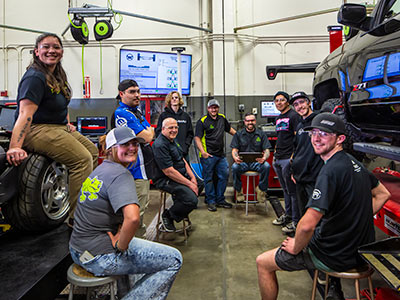Overview

Working in automotive can be one of the most rewarding careers you can find in technology. The vast majority of US households have access to different motorized vehicles, and everyday automotive experts have the opportunity to impact the lives of people throughout the community. Along with being an incredibly diverse field, the automotive industry is continually growing, with engineers working to create safer and more reliable transportation.
TMCC offers a two-year transportation technologies associate of applied science degree with an emphasis in automotive technology, and one-year certificates of achievement for automotive repair technicians of every level, from the general auto maintenance worker to ASE® certified master technicians.
What Will I Study?
After studying to work in the automotive industry, you will leave the program with a well-rounded knowledge of the inner workings of different automotive vehicles. As an incoming student, you’ll typically begin learning about automotive electrical systems and how to test and repair different aspects of the vehicle, such as the batteries, starting systems, and charging systems. After completing industry safety training, you will then learn more about the rest of automotive service. All parts of the automotive service industry are studied including engine repair, brakes, steering and suspension, automatic and manual transmissions, air conditioning, and engine performance. Courses will be hands-on and will train you to problem solve as well as to troubleshoot any issues they may come across in your professional career.
TMCC is proudly partnered with Subaru-U, MOPAR CAP, and Ford ACE for any students looking to create unique partnerships with certain retailers across the US. These web-based curriculums come at no extra cost and are designed to prepare you for a variety of automotive jobs, whether it be retail or technical.
College Catalog Information
Check out additional Degree and Certificate information, including Recommended Course Schedule, Program Requirements and Program Outcomes.
- Degrees
- Certificates of Achievement
- Skills Certificates
- Courses